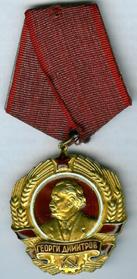BULGARIA
(SOCIALIST)
Click on award for
recto/verso or use Flash

|
|
|
|
|
|
|
|
|
|
|

|
| Order
of Order of Georgi Dimitrov |
 |
 Made
of Gold, unnumbered, hollow with two air vents on reverse,
the Order of Georgi Dimitrov was the highest award or the
People's Republic of Bulgaria. Instituted on 17 June 1950
it was awarded to Bulgarians and foreigners for outstanding
services to the defence and freedom of Bulgaria, or contributions
to socialism. It weighs 31.6g and some 4.500 were issued.
I bought it at the 15th Zeige Auction (lot 860) and it comes
with original box with the Bulgarian coat of arms. Made
of Gold, unnumbered, hollow with two air vents on reverse,
the Order of Georgi Dimitrov was the highest award or the
People's Republic of Bulgaria. Instituted on 17 June 1950
it was awarded to Bulgarians and foreigners for outstanding
services to the defence and freedom of Bulgaria, or contributions
to socialism. It weighs 31.6g and some 4.500 were issued.
I bought it at the 15th Zeige Auction (lot 860) and it comes
with original box with the Bulgarian coat of arms.
Dimitrov, a member of Bulgarian and international
communist movement, was born on 18 June 1882 in a craftsman's
family of Kovachevtsi village, district of Pernik (western
Bulgaria).
Dimitrov lived in Berlin when Hitler seized
power. He was arrested with two other Bulgarian communist
activists Blagoy Popov and Vasil Tanev, as well as a German
communist E.Torgler and a Dutchman Marinus van der Lubbe.
The Reichstag fire, staged by Nazis on 27 February 1933 in
order to compromise opposition parties, and justify mass reprisals,
could have a tragic finale to the four defendants. During
the Leipzig trial, which lasted from 21 September to 23 December
1933, Dimitrov was the main defendant. He did not only dismiss
charges against him but also used the courtroom to denounce
the real goals of the hitlerism and Nazi dictatorship in Germany.
In his famous speech for the defence he denounced false testimony
of Hermann Göring, the main witness of the prosecution, and
pointed at him and his aides as the real culprits of the arson.
Dimitrov's speech during the Leipzig trial brought him a worldwide
support of the public opinion. This reaction as well as Dimitrov's
attitude caused acquittal of the accused communists. Only
van der Lubbe was sentenced to death and executed.
After the release from prison Dimitrov had
made in the beginning of 1934 for the Soviet Union. He was
stripped of his Bulgarian citizenship and obtained the Soviet
one. He settled first in Leningrad, where he was elected a
member of the city executive council, later he moved to Moscow,
where he assumed duties of the secretary general of the Executive
Council of the Communist International. He held this post
until the dissolution of the Comintern in 1943. In 1937-1945
he was a member of the Supreme Council of the USSR.
In 1942 during the Second World War Dimitrov
initialized creation of the Fatherland Front (OF) of Bulgaria,
and assumed its leadership. For his merits in the struggle
with fascism the Presidium of the Supreme Council of the USSR
awarded him with the Order of Lenin. On 6 October 1945 - after
22 years in exile - Dimitrov had returned to his country where
he became in December the secretary general of the CC of BCP,
and in November 1946 also the president of the Council of
Ministers. In 1947 under his leadership was worked out the
constitution of the People's Republic of Bulgaria proclaimed
on 4 December 1947. He died on 2 July 1949 at spa in Barvikha
near Moscow.
After his death a personal cult of Dimitrov
was created in communist Bulgaria. The Order of Dimitrov was
established the highest award in communist Bulgaria. His name
was given to many factories, schools, and streets, the Young
Communist League as well as to the town Dimitrovgrad built by
Bulgarian youth in 1947. The Dimitrov's Award was established
as the highest award for achievements in science, technics,
literature, and arts. His body was entombed in a mausoleum in
Sofia and his former apartment was turned into a museum.
| A | Abundant,
readily available, often in wholesale quantities. | | C | Common,
always available. Occasionally in quantity. | | R1 | Usually
available without a long delay. Difficult to find in quantity. |
| R2 | Scarce
to rare, less seldom available. | | R3 | Rare.
Difficult to find. | | R4 | Very
rare. Demand outstrips supply, and specimens, when available are often eagerly
sought. | | R5 | Extremely
rare and seldom available. Collector may have to search for a few years to locate
one. | | R6 | Of
the highest rarity. Very difficult to obtain. | | R7 | Almost
never available. Most collectors will not have a chance to acquire these pieces. |
| R8 | Never
been on the market. Almost impossible to obtain. |
| R* | Not
available for collections. |
|
